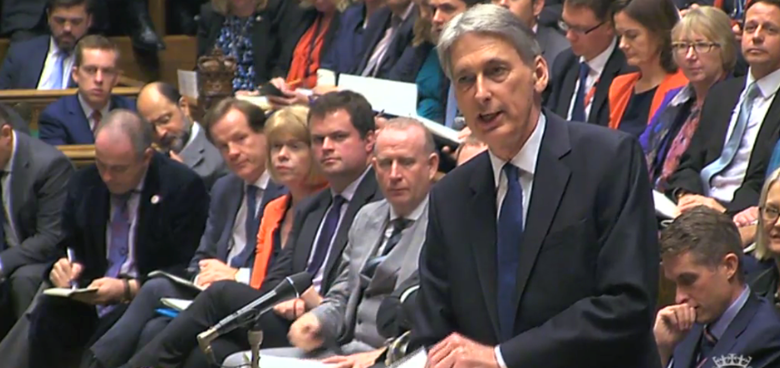Autumn Statement: Key measures and reaction
Neil Puffett
Wednesday, November 23, 2016
Chancellor of the Exchequer Philip Hammond has delivered the Autumn Statement in parliament today. CYP Now looks at what it means for children and families.

Although Philip Hammond's speech contained the prospect of additional support for certain groups, such as young people in custody, rough sleepers, and those struggling to get by, arguably more conspicuous was what was absent.
Earlier this week, there had been suggestions that government was set to beef up its commitment to childcare in advance of plans to provide 30 hours of free provision for three- and four-year-olds from next September, but there was no announcement on this.
The Chancellor did say childcare would be exempt from a crackdown on salary sacrifice schemes, and also said that the government will review the operation of tax-free childcare once the scheme has fully rolled out, but this did little to placate the early years sector.
Neil Leitch, chief executive of the Pre-school Learning Alliance, said his organisation was left "very disappointed".
"The early years play a vital role in supporting children's learning and development - particularly those from more disadvantaged backgrounds - and yet despite much government rhetoric on the importance of closing the gap and improving children's life chances, the increased investment needed to achieve these goals has not materialised," he said.
"Today was a missed opportunity for the government to show that it had listened to the sector's concerns and taken the steps needed to ensure that it will be able to deliver on the promise that it made to parents last year.
Purnima Tanuku, chief executive of the National Day Nurseries Association, also expressed concern. She said that while some measures in the Autumn Statement will increase take-home pay for workers in the sector, the knock-on impact will be higher wage bills for providers.
"As government funding fails to keep up with nurseries' soaring costs, this is another blow to sustainability. We need the government to act now to support nurseries in order for them to be in a position to deliver its ambitious 30 hours of funded childcare next year," she said.
In terms of supporting lower earners, Hammond reduced the Universal Credit "taper rate" - how quickly the benefit is withdrawn as recipients earn more - from 65 to 63 per cent at a cost of £600m, meaning claimants will be able to keep an additional 2p for every pound they earn at work.
But Matthew Reed, chief executive of The Children's Society, said the move did not provide much help to "just managing families".
"Of course the £600m provided to undo a proportion of cuts to Universal Credit will help, although the lowest-income working families receiving the benefit will gain the least. So will increases to the minimum wage," he said.
"But these improvements are measly morsels next to the nearly £11bn of ongoing cuts announced last year which will cut support for struggling families in 2020."
Anna Feuchtwang, chief executive of the National Children's Bureau, said: "Amending the rate at which Universal Credit tapers off for those in work is a step in the right direction: most children in poverty have a parent in work and families rely on in-work benefits to make ends meet.
"But after years of cuts under the previous Chancellor, this is too little to resurrect hard-up families' standard of living."
Hammond also used his speech to re-announce existing funding pledges.
The government will provide up to £500m of additional funding to the Ministry of Justice to enable it to recruit 2,500 extra prison officers to improve prison safety and fund wider reforms to the justice system.
The funding could extend to the youth justice system where concerns about safety in youth custody have been raised numerous times in recent years.
Hammond also re-emphasised the government's commitment to supporting grammar schools to expand - with a £50m a year capital fund.
Meanwhile, background documents published today by the Treasury also reveal that the government's Rough Sleeping Fund will be boosted with an additional £10m over the next two years, doubling its size.
The cash will be available to support and scale up innovative approaches to preventing and reducing rough sleeping, particularly in London.
The background documents also reveal that draft legislation for the government's proposed soft drinks industry levy will be published on 5 December.




